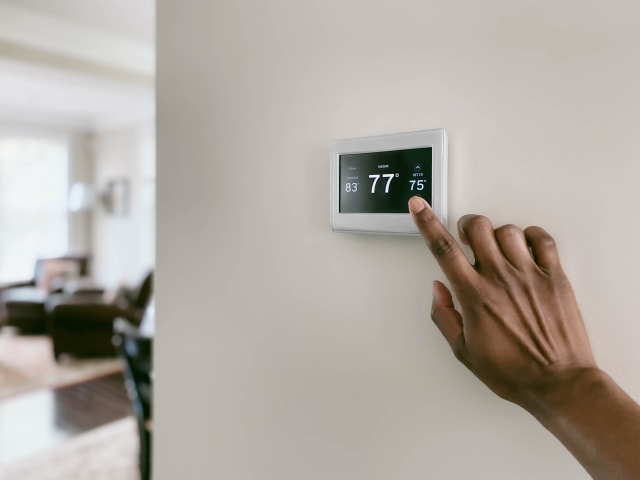Comfort zone
Why some people feel hot when others feel cold.
Article Date:

Are you the person in the office who always keeps a sweater around, or the one who always sits in front of a fan? Should the thermostat be set to 68 degrees or 72? If you feel too hot or too cold in a room where others feel fine, it’s not all in your head.
“Different people can actually have different internal core temperatures in the same exact environment as each other,” said Katie Cantrell, MD, a family physician with Baptist Primary Care.
In rare cases, it could be a sign of poor health. But more typically, it boils down to differences in body composition, Dr. Cantrell said. Your place on the bell curve can change if you:
- Are overweight/underweight. Typically, larger people are more likely to feel warm and thinner people are more likely to feel cold, Dr. Cantrell said. “It's simply because you have more insulation or less insulation on your body. Kind of like a house.”
- Are elderly. Older people tend to have thinner skin and not as much body fat under their skin, so they often feel colder compared to a younger person, Dr. Cantrell said. “Sometimes you can see the difference,” she said. “For example, the person’s skin bruises easily or is discolored.”
- Have a fast/slow metabolism. Your metabolic rate is the number of calories you naturally burn while at rest. People who have a higher metabolic rate feel warmer. People with a lower metabolic rate burn fewer calories and so they may feel cooler.
- Are a man/woman. Men and women are different in two ways. Their body composition is different and their metabolism is different. So, it’s common for men and women to disagree about whether a room is too hot or too cold.
Your body’s heat controls
Your thyroid is the thermostat that controls how hot or cold your body feels. When your core temperature is too hot, your thyroid releases hormones to speed up your metabolism so you’ll throw off heat. If your core temperature drops, your thyroid lowers your metabolic rate so you’ll conserve more energy.
You may notice your hands and feet getting cold even though the rest of your body feels fine. That’s because hormone levels have constricted the tiny blood vessels in your extremities, sending more blood back to your core to keep you warm, Dr. Cantrell said.
A sign of health?
It’s common to think feeling warm is a sign of good health and feeling cold is a sign of sickness. But there are health issues that can cause people to feel either way, Dr. Cantrell said. For example, if your thyroid is overactive or underactive, it will produce either too many or too few hormones. Then, you’ll either feel too hot (overactive thyroid) or too cold (underactive thyroid).
“It’s true there are health conditions that make you feel cold, like anemia, being anorexic, poor circulation or diabetes. But someone who feels the opposite and is wearing shorts and a T-shirt outside when it's cold doesn't necessarily mean they’re super healthy. They could have hyperthyroidism, or they could be obese,” Dr. Cantrell said. “Healthy is when there’s a balance.”
If you have questions about feeling too hot or too cold, Baptist Primary Care physicians are ready to answer them. Call 904.202.4YOU or click here to find the right physician for you.



